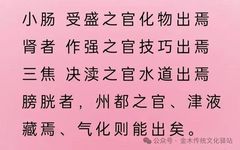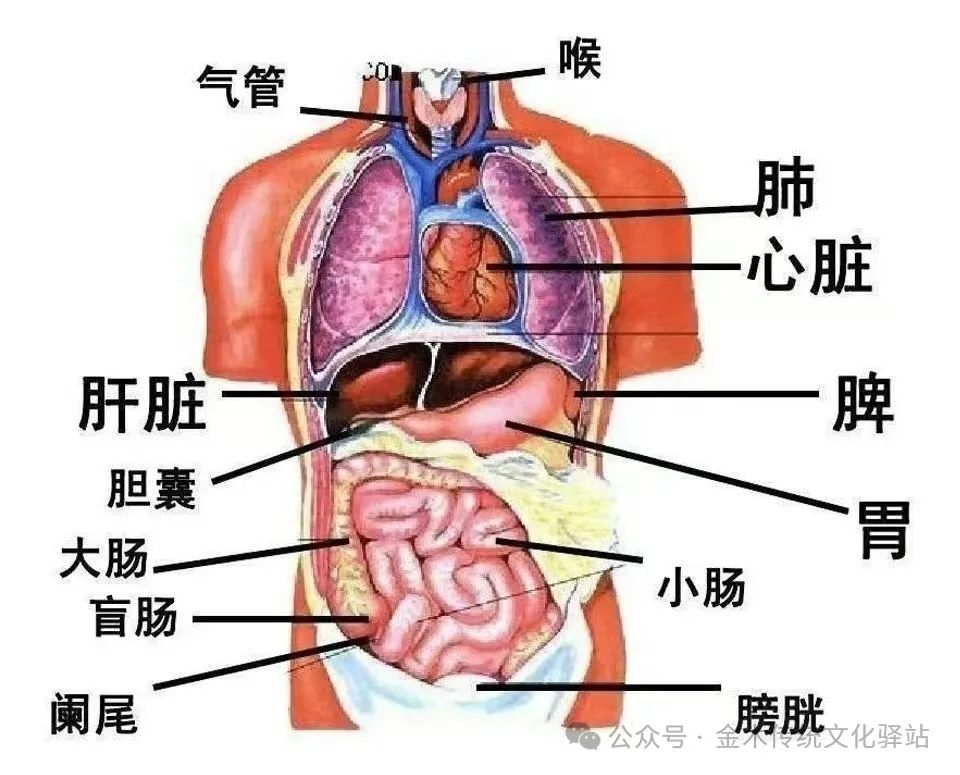
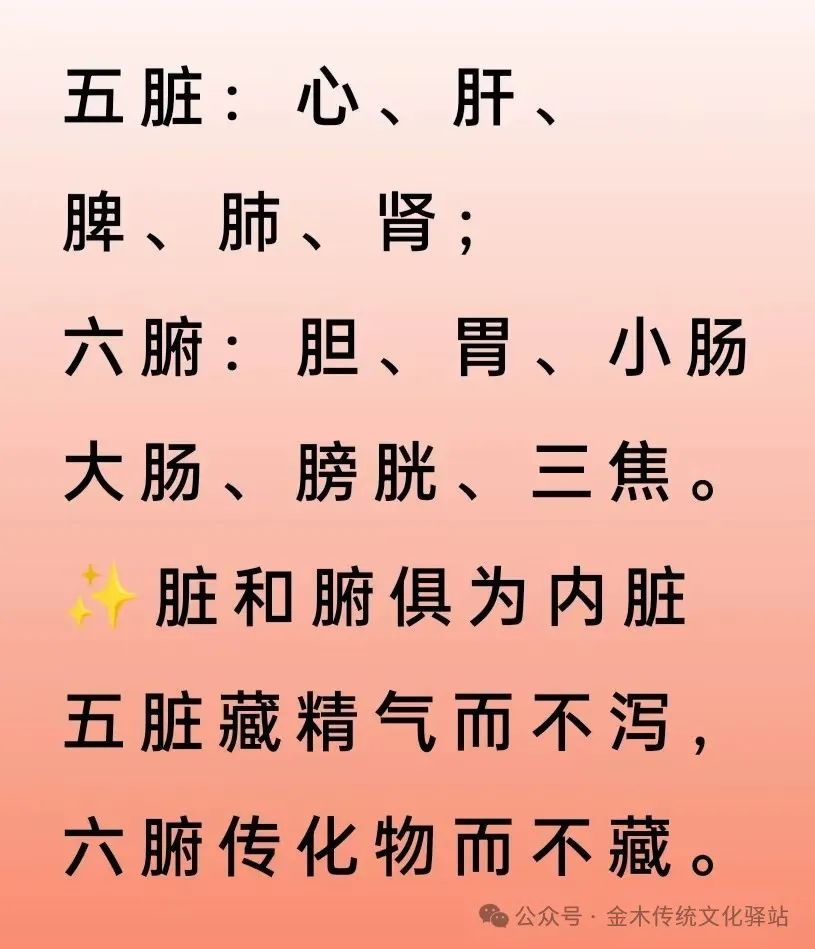
Five Organs: The heart (xin), liver (gan), spleen (pi), lungs (fei), and kidneys (shen).
Six Bowels: The gallbladder (dan), stomach (wei), small intestine (xiao chang), large intestine (da chang), bladder (pang guang), and san jiao (triple burner).
The organs and bowels are both internal organs, but their distinctions are:
The five organs store essence and qi without excreting, while the six bowels transmit and transform substances without storing. Organs that have the function of receiving, transporting, and transforming food and fluids belong to the bowels; organs that do not directly transform food and fluids but have the function of storing essence belong to the organs.
1. Heart (xin)
The heart generates blood and houses the spirit (shen). It is the ruler of life activities in the human body. If the heart is not healthy, or is stimulated by emotions, or invaded by pathogens, symptoms such as palpitations, anxiety, insomnia, forgetfulness, inappropriate laughter, delirium, and confusion may occur.
When the heart undergoes pathological changes, it not only loses its autonomy but can also disrupt the activities of other organs.
2. Liver (gan)
The liver stores blood and governs planning. The liver is strong in nature, hence it is also called the general. When stimulated mentally, it often affects its normal function, leading to symptoms such as anger and headaches, and even upward fire causing vomiting of blood.
The liver is also considered the “pre-natal” for women (indicating reproductive function), thus treatment of menstrual issues and fertility must focus on the liver.
3. Spleen (pi)
The spleen governs blood and is responsible for transformation and transportation. The main source of life force is nutrition; the spleen digests food and transports its essence throughout the body, hence it is called the “post-natal” foundation. If the spleen’s ability to transform is insufficient, it can lead to bloating after eating, resulting in muscle wasting and mental fatigue.
The spleen also governs the transformation of dampness; symptoms of damp stagnation, such as chest tightness, nausea, diarrhea, and edema, are often due to spleen weakness, thus draining dampness often involves strengthening the spleen.
4. Lungs (fei)
The lungs govern qi and are responsible for clearing and regulating. When lung qi fails to descend, it easily leads to cough and asthma; in cases of deficiency, symptoms such as shortness of breath and weak speech are common. The lungs also play a regulatory role in the circulation of blood governed by the heart; ancient texts describe the heart as the ruler and the lungs as the minister.
5. Kidneys (shen)
The kidneys store essence and govern strength. The kidneys play a positive role in energizing the body; kidney deficiency can lead to symptoms such as dizziness, tinnitus, poor vision, low back pain, weakness in the legs, and lethargy.
The kidneys are considered the “pre-natal” for men, similar to the liver’s role for women, referring to reproductive function. Thus, issues such as decreased libido, nocturnal emissions, cold semen, and premature ejaculation are treated through the kidneys.
The kidneys have a unique characteristic: there are two kidneys, the left being the kidney (shen) and the right being the gate of life (ming men). The kidneys govern yin, while the gate of life governs yang, hence the kidneys are also referred to as the “organ of water and fire.” The true yin and true yang referred to in clinical practice also pertain to this.
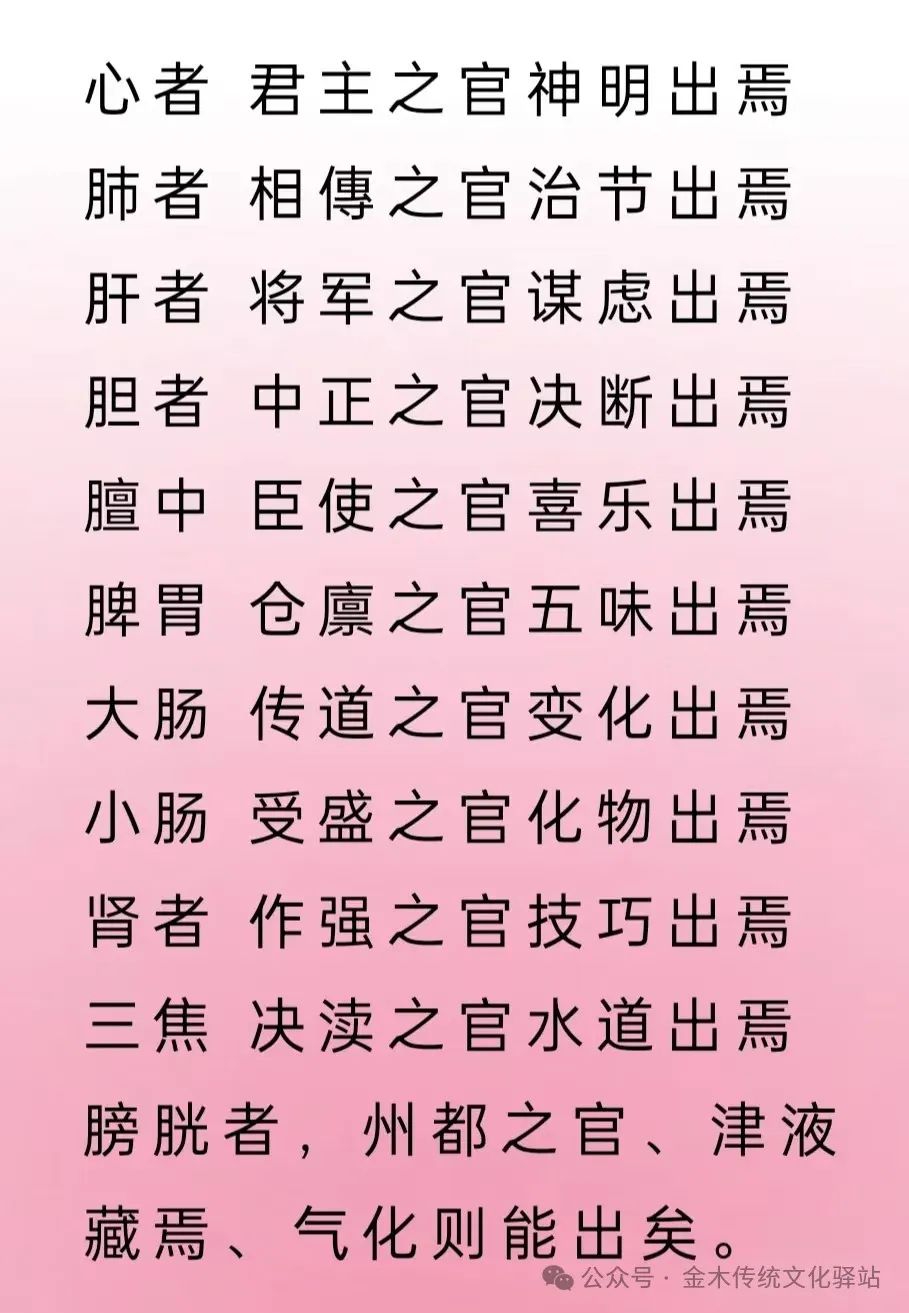
6. Gallbladder (dan)
The gallbladder is the organ of clarity and governs decision-making. The gallbladder and liver are interrelated; even if the liver qi is strong, without the gallbladder’s continuity, the liver and gallbladder work together to achieve courage.
In the human body, the heart is the “fire of the ruler,” while the gallbladder and gate of life are the “fire of the minister.” If gallbladder fire is excessive, symptoms such as irritability, headaches, chest tightness, rib pain, bitter mouth, and vomiting of bitter water may occur.
7. Stomach (wei)
The stomach is the sea of food and fluids, responsible for receiving. The stomach and spleen are interrelated; although the stomach is responsible for receiving and the spleen for digestion, the stomach’s basic function includes both receiving and digesting, hence the stomach and spleen are often mentioned together.
It is believed that if the stomach cannot receive, digestion cannot occur, thus it is said, “If the stomach receives food, it thrives; if it does not, it perishes; with stomach qi, there is life; without stomach qi, there is death,” highlighting the importance of the stomach’s function.
8. Small Intestine (xiao chang)
The small intestine is the organ of reception and transformation. The small intestine receives the food and fluids that have been digested by the stomach, further separating the clear from the turbid, allowing the essence to be stored in the five organs and the waste to be excreted through the six bowels, while the waste’s liquid is sent to the bladder and the residue to the large intestine. These are the functions of the small intestine in transformation.
9. Large Intestine (da chang)
The large intestine is the organ of conduction, responsible for excretion. The large intestine receives the waste from the small intestine and is responsible for transporting and excreting it, being the final stage of the entire digestive process.
Since the function of the large intestine is to conduct waste and manage bowel movements, any issues such as constipation, diarrhea, dysentery, and blood in the stool are addressed through the large intestine, employing various methods such as conducting, moistening, and binding.
10. Bladder (pang guang)
The bladder is the official of the state, responsible for qi transformation. The bladder is where water and fluids accumulate; if qi transformation is obstructed, it leads to urinary retention; if qi transformation is excessive, it results in incontinence. However, the bladder’s qi transformation is related to the kidneys; if kidney qi is sufficient, transformation can occur; if kidney qi is deficient, transformation cannot occur, thus treatment for urinary issues sometimes involves warming the kidneys.
11. San Jiao (triple burner)
The san jiao is the official of drainage, responsible for water movement. The san jiao consists of three parts: upper jiao, middle jiao, and lower jiao. Its main function is to clear the water pathways; for example, to treat water retention and bloating, qi-regulating methods are often used to assist in water movement, commonly employing herbs that promote the flow of the san jiao.
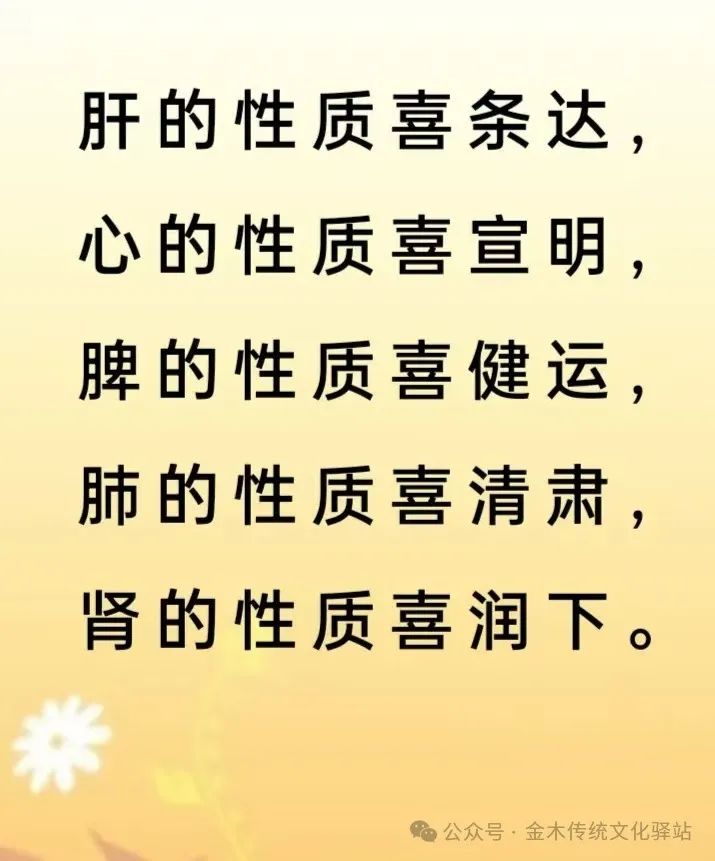
There is a mutual governing relationship between the organs:
The kidneys govern the heart, the heart governs the lungs, the lungs govern the liver, and the liver governs the spleen. “Governing” means mutual restriction to maintain balance.
There is also a mutual cooperation relationship between the organs and bowels:
The lungs cooperate with the large intestine, the heart with the small intestine, the liver with the gallbladder, the spleen with the stomach, and the kidneys with the bladder. “Cooperation” means working together, indicating that the organs serve as the body, while the bowels serve as the function, working together to complete their combined functions.
Exterior and interior: The organs are yin and belong to the interior, while the bowels are yang and belong to the exterior, hence this cooperation is also called “exterior and interior.”
① The relationship between the internal organs and the body’s various tissues and organs:
Commonly used in clinical practice, such as:
The liver opens to the eyes, fills the tendons, and manifests in the nails;
The heart opens to the tongue, fills the vessels, and manifests in the face;
The spleen opens to the mouth, fills the muscles, and manifests in the lips;
The lungs open to the nose, fill the skin, and manifest in the hair;
The kidneys open to the ears, fill the bones, and manifest in the hair.
The spleen governs the four limbs, particularly at the joints:
The elbows belong to the heart and lungs, the armpits belong to the liver,
The hips belong to the spleen, and the knees belong to the kidneys.
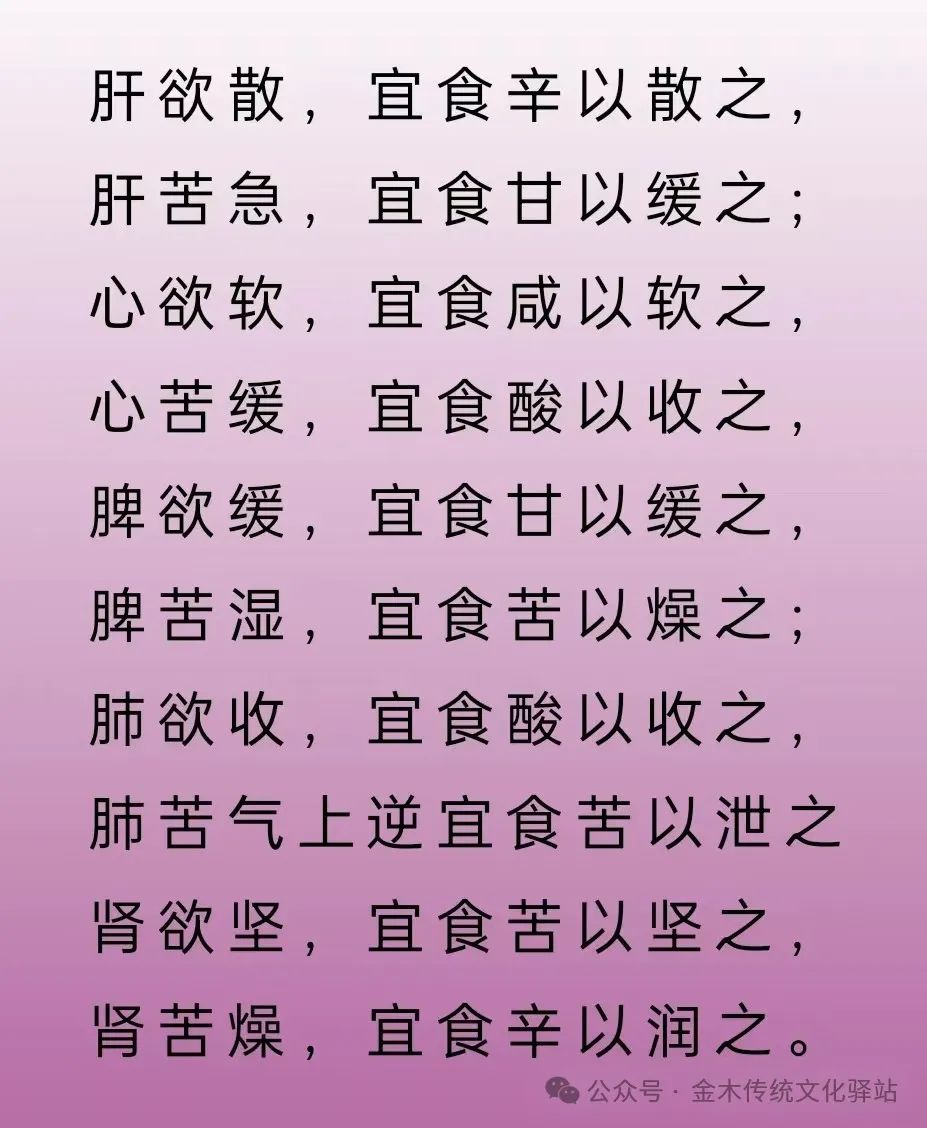
② The properties of the five organs:
The liver’s property is to be free-flowing, the heart’s property is to be clear and bright,
The spleen’s property is to be strong and active, the lungs’ property is to be clear and regulating,
The kidneys’ property is to be moistening and descending.
In treatment, there is a rule:
If the liver desires to disperse, it is advisable to eat pungent foods to disperse it; if the liver is bitter and urgent, it is advisable to eat sweet foods to soothe it;
If the heart desires to soften, it is advisable to eat salty foods to soften it; if the heart is bitter and slow, it is advisable to eat sour foods to gather it;
If the spleen desires to relax, it is advisable to eat sweet foods to relax it; if the spleen is bitter and damp, it is advisable to eat bitter foods to dry it;
If the lungs desire to gather, it is advisable to eat sour foods to gather it; if the lungs are bitter and qi is rising, it is advisable to eat bitter foods to drain it;
If the kidneys desire to strengthen, it is advisable to eat bitter foods to strengthen it; if the kidneys are bitter and dry, it is advisable to eat pungent foods to moisten it.
③ Judging the pathological changes of the five organs:
Based on the normal and abnormal comparisons of the five organs, one can discern internal organ pathologies, such as:
The heart houses the spirit; excessive laughter indicates an excess of spirit, while excessive sadness indicates a deficiency of spirit;
The lungs govern qi; coughing and wheezing indicate an excess of qi, while shortness of breath and difficulty breathing indicate a deficiency of qi;
The liver governs blood; irritability indicates an excess of blood, while fearfulness indicates a deficiency of blood;
The spleen governs form; abdominal bloating and urinary difficulties indicate an excess of form, while weakness in the limbs indicates a deficiency of form;
The kidneys govern will; diarrhea and bloating indicate an excess of will, while reversal indicates a deficiency of will.
Additionally:
Chest and abdominal bloating, heavy and unclear speech indicate accumulated dampness in the middle jiao;
Low and weak speech, inability to connect words indicate extreme deficiency of qi;
Speech that does not avoid intimacy, clothing that is not self-covered indicate disordered spirit;
Excessive diarrhea indicates instability of the large intestine;
Incontinence indicates the bladder cannot restrain;
Furthermore:
The head is the residence of the spirit; if the head droops and cannot rise, and the eyes are sunken and lack brightness, it indicates extreme fatigue of spirit;
The back is the residence of the chest; if the back is hunched and the shoulders droop, it indicates weakness of organ qi;
The waist is the residence of the kidneys; if there is pain and inability to turn, it indicates kidney deficiency;
The knees are the residence of the tendons; if there is difficulty in bending and stretching, and walking is difficult, it indicates weakness of the tendons;
The bones are the residence of the marrow; if one cannot stand for long, and there is shaking while standing, it indicates weakness of the bones.
In this way, it is said that what is within manifests externally, thus external observations can reveal internal conditions, which is greatly helpful in clinical practice.
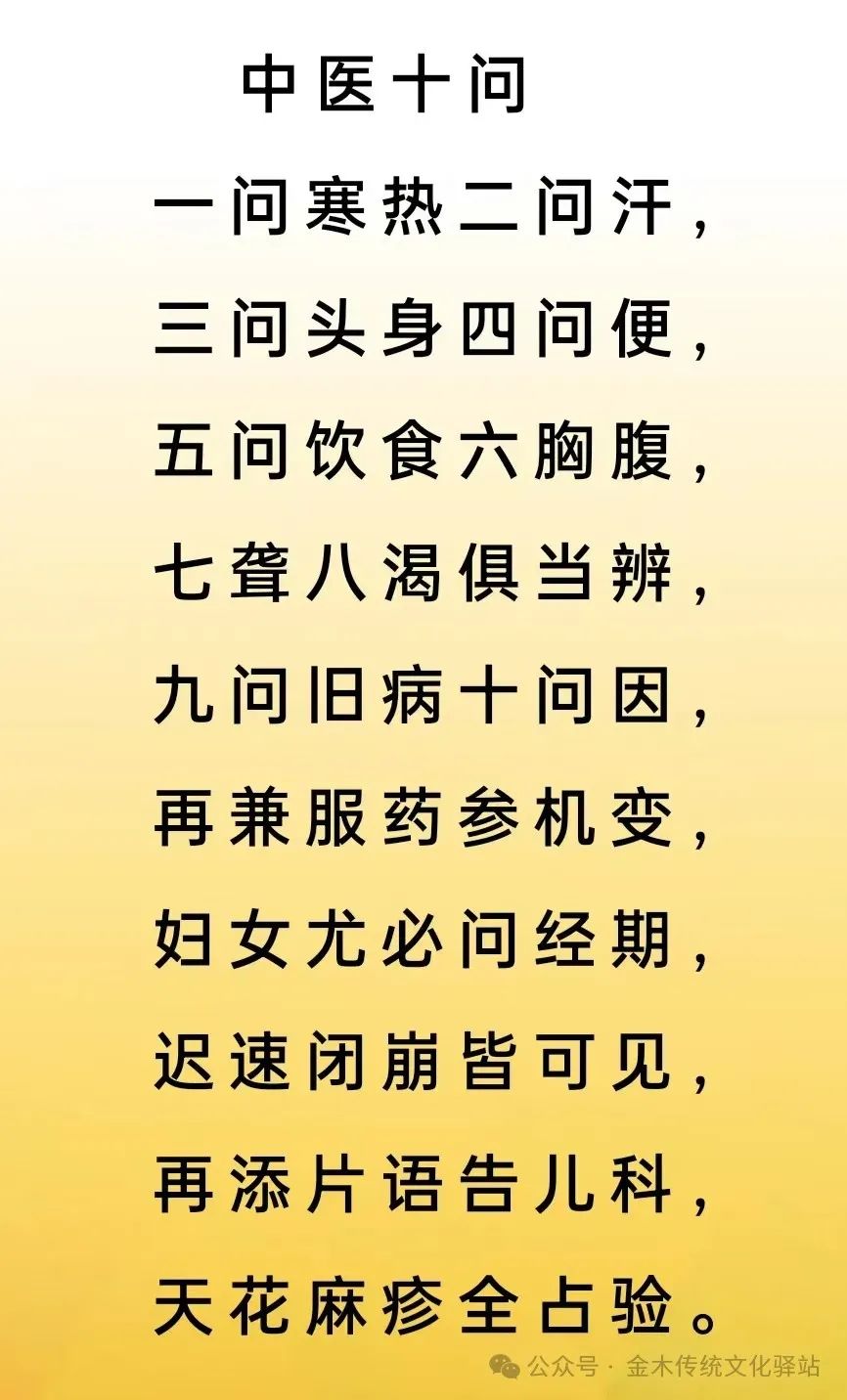
Disseminating knowledge of TCM health preservation, promoting Chinese traditional culture, sharing health concepts, and conveying care, passing health knowledge and traditional culture to more friends…
People are great because they have dreams; we are different because we have love.
Liu Qing Ning: 182 7127 1941 or (WeChat ID)
Yang Shun Song: 138 7171 7447 or (WeChat ID)


